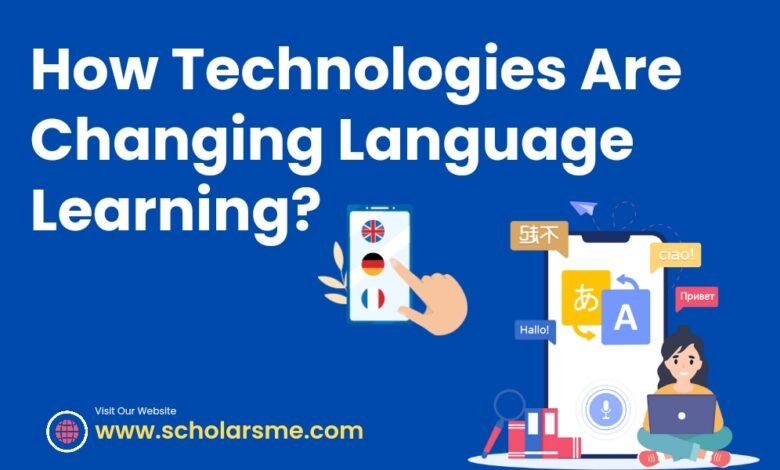How Technologies Are Changing Language Learning?

We’re currently living in a world that is filled to the brim with multitudes of technologies; we have our genius minds to thank for that. It’s altering the world for the better, may it be the Education system, or communication tech.
Although we all know that technology is changing the world as we speak, you may often ponder about to what extent the changes take place. Now, tech is extremely progressed in various fields, but just to give you an idea, I’ll tell you about the lasting impacts technology inflicts on language learning. So, let’s begin!
The Extent Of Technologies’ Impact on Language Learning
Technology is now vastly used for many reasons, including educational purposes. Users are given the privilege to leverage AI tools and applications like Duolingo, Google online courses, Babbel, etc. These allow potential candidates to improve their language proficiency, and even communication skills, by chatting with AI bots. It’s truly a wonder how far we’ve come.
By utilizing these apps and tools, one can easily mend their language problems by assessing virtual and theoretical scenarios of communication, eventually making their real life conversations easier.
How Technologies Help You to Learn Languages?
The landscape of language comprehension had majorly changed as technology took over, here’s how they can help you too:
- They’re cheap and accessible for all. One of the best things about technologies is that they’re not exclusive to some; anyone can use them, and it costs only a tiny percentage of traditional language learning methods. Some apps & courses are even free!
- Advanced technologies can be customized to fit your learning capabilities, such as adaptive software has the ability to analyze your performance, and feedback to give you courses accordingly. Even traditional training institutions use these tools to teach.
- Technologies also provide you with the opportunity to collaborate and communicate with other people, or chatbots. Especially, free English-learning courses online, let users speak to native speakers, and such to flourish their communication skills.
- Tech is capable of giving you real-time learning experience, through many platforms, e.g. communication platforms or even streaming platforms like Netflix and Hulu. If you’re a fan of movies or shows, you can watch something that targets the specific language that you want to learn, so you’d be able to learn through entertainment.
- Technologies help people with disabilities to learn languages easily, as they wouldn’t have to travel or move around to learn. It makes life easier; it’s inclusive for all.
Learning via virtual reality (VR)
This is a really interactive and engaging way of tackling your language learning problems. By allowing learners to enter a simulation of cultural environments and virtual communication in real time, it brings an authentic learning curve for people.
You can converse with different characters in the language you’re learning; it’ll feel very close to real life. Through its virtual abilities, it can take you to various corners of the world, where you can study a specific culture or language. It’s much more effective and real than traditional methods.
Podcasts
Podcasts are an easier alternative to other ways of learning a language, as you can access them easily and even hear how people conduct a conversation with each other, while they discuss a particular topic.
From this technique, you can familiarize yourself to the native speakers’ accents, pronunciations, natural flow and even slangs. Observe the words they use, so you’ll be able to expand your vocabulary. It’s just like watching two people talk in real life, therefore it’s the perfect way to hone your language learning skills for future uses. Podcasts seldom touch on cultural topics as well; learn from what they talk about and internalize it.
Natural language processing (NLP)
In case you’re not familiar with this concept, NLP is basically a computer’s capability to break down human language; all of the AI writing tools mostly depend on this to write and produce content.
It has been a thing for about 50 years now, yet it’s only been blowing up recently for its immense language conversion skills. By receiving real human inputs, this is able to provide results that fit your learning criteria.
Online platforms to learn languages
It’s one of the most accessible ways of obtaining language skills; for example, language learning apps and courses. They provide a planned out program to make learning more fun and hassle free.
You can know about every aspect of a language with these platforms, e.g. reading, writing and speaking. If you want to learn for free, that’s possible too. Search for best free online courses and you’ll see plenty of options. It’s really that simple.
You can check Language Courses in Abu Dhabi from anywhere at their own pace and according to their schedules, making language education more accessible and convenient.
Language learning AI tools
AI apps and AI writing generators are all the rage currently. There’s a good reason why; they can improve your writing skills, provide grammar guidance and actual stories.
You can chat with bots in any language you like and they’d guide you through it, by whatever difficulty level you instruct. It’s interactive and much simpler than you can imagine, so if you’re looking for such AI tools, I took the time to list a few. See below.
Best AI Writing Tools For Language Learning:
- ChatGPT: Well, I’m pretty sure you’re familiar with this one. It’s a communicative platform, where you can converse with a chatbot to know and learn about many things, including writing. It supports over 10 languages you can choose from, so learn away.
- Mondly: It’s one of the best AI tools to learn a language as it offers over 33 languages, with vigorous learning strategies. It employs chatbots and speech recognition tech, so it’s interactive as well! You can write whatever you want and communicate with your bot, or even train it to fit your needs better. It’s a wondrous platform for language learners.
- Lingvist: Although it only carries 5 languages, this is great for people who want to grow their vocabulary. The learning system is really simple, so you may think it’s not worth it. But let me tell you, the simplicity is what makes the experience less jarring. You basically fill in the blanks with a required word. Just type in the missing word; really simple, right? Yet it’s effective too.
FAQs
- How technology has affected language learning?
By making the process easier through immersive inventions that are efficient and affordable.
- Why is it important to use technology in language teaching?
It provides a plethora of techniques that you wouldn’t have known otherwise.
- What technologies are used in language teaching and learning?
Natural language processing and GPT tech.
- What is the impact of communication technology on language?
Communication technology helps break language and cultural barriers, bringing people together.
- How technology has improved English language?
By letting everyone access advanced vocabulary and structured grammar, technology had made English more comprehensible.
- Why is technology important for English language learners?
It allows you to assess contextual cues and many learning techniques, such as through VR and AR, you get to learn with more efficacy than conventional systems.
Conclusion
Technologies and AI have greatly reshaped the path of education, and it’s only uphill from here. If you know how to use these tools to your benefit, you’ll see just how helpful they’re to mankind.
However, there are limitations as well, so let’s not forget to not depend on them too much. They’re our assistants, not our replacements.


